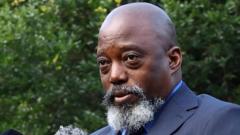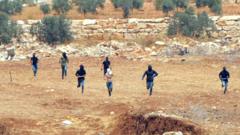**In a historic decision, the Democratic Republic of Congo's Senate has removed Joseph Kabila's legal immunity, allowing for potential prosecution over claims of supporting rebel groups.**
**DR Congo Senate Moves to Prosecute Ex-President Kabila for Treason**

**DR Congo Senate Moves to Prosecute Ex-President Kabila for Treason**
**Former leader Joseph Kabila faces treason charges as Senate lifts his immunity amid armed group allegations.**
In a landmark ruling, the Senate of the Democratic Republic of Congo has effectively stripped former President Joseph Kabila of his immunity, enabling prosecutors to move forward with treason charges related to his alleged involvement with the M23 rebel group. This decision follows accusations that Kabila provided support to armed insurgents operating in the eastern part of the country, where conflict and instability have been ongoing.
The accusation comes with a significant dossier of evidence, including documents and witness statements, allegedly linking Kabila to the M23 group, which has been accused of taking control over vast territories rich in minerals. Kabila, who served as president from 2001 until 2019, abstained from attending the Senate proceedings where nearly 90 senators voted in favor of his prosecution, with only five opposing it.
Senate Speaker Jean-Michel Sama Lukonde announced the decision, indicating the Senate's willingness to allow legal proceedings despite Kabila's longstanding claims of no involvement with the rebels. Following his presidency, Kabila was granted a "senator for life" title, which previously afforded him immunity from prosecution.
The military prosecutor's request for the Senate to lift Kabila's privileges marks a crucial step towards accountability, as the former leader has been residing in South Africa for the past two years. Prior to this decision, Kabila had hinted at returning to the Congo to engage in finding solutions to the ongoing conflict in the east. However, reports of his return to Goma, a city currently held by the M23, were quickly denied by his political party, the People's Party for Reconstruction and Democracy (PPRD).
Justice Minister Mutamba has called for the seizure of Kabila's assets, emphasizing that he should be compelled to return home and confront the charges against him. Analysts suggest that Kabila's trial could lead to increased unrest within the country, which has faced escalating violence from the M23 since 2012. The PPRD has criticized the prosecution as a "theatrical" move, aimed at diverting attention from the significant issues confronting the Congolese populace.
The accusation comes with a significant dossier of evidence, including documents and witness statements, allegedly linking Kabila to the M23 group, which has been accused of taking control over vast territories rich in minerals. Kabila, who served as president from 2001 until 2019, abstained from attending the Senate proceedings where nearly 90 senators voted in favor of his prosecution, with only five opposing it.
Senate Speaker Jean-Michel Sama Lukonde announced the decision, indicating the Senate's willingness to allow legal proceedings despite Kabila's longstanding claims of no involvement with the rebels. Following his presidency, Kabila was granted a "senator for life" title, which previously afforded him immunity from prosecution.
The military prosecutor's request for the Senate to lift Kabila's privileges marks a crucial step towards accountability, as the former leader has been residing in South Africa for the past two years. Prior to this decision, Kabila had hinted at returning to the Congo to engage in finding solutions to the ongoing conflict in the east. However, reports of his return to Goma, a city currently held by the M23, were quickly denied by his political party, the People's Party for Reconstruction and Democracy (PPRD).
Justice Minister Mutamba has called for the seizure of Kabila's assets, emphasizing that he should be compelled to return home and confront the charges against him. Analysts suggest that Kabila's trial could lead to increased unrest within the country, which has faced escalating violence from the M23 since 2012. The PPRD has criticized the prosecution as a "theatrical" move, aimed at diverting attention from the significant issues confronting the Congolese populace.





















